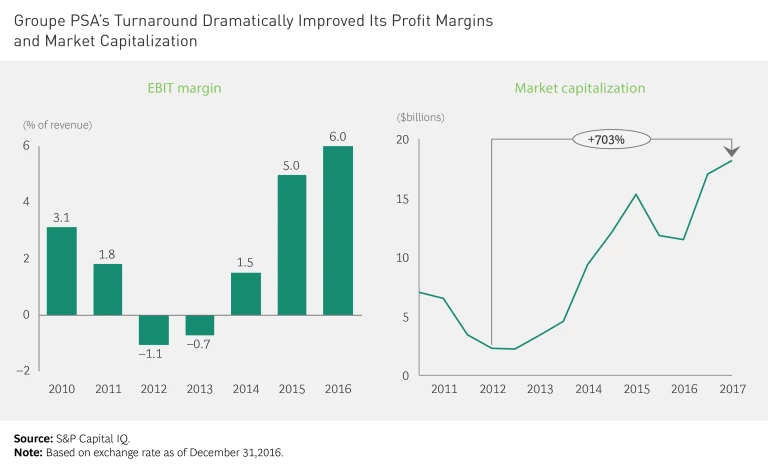This is an excerpt from The Comeback Kids: Lessons from Successful Turnarounds.
Groupe PSA, the parent company of Peugeot, Citroën, Opel, Vauxhall Motors, and DS Automobiles, was languishing after the financial crisis in a weak automotive market in Europe. Overall, car sales in the region plunged in 2012 and lagged into 2013 as well, yet Groupe PSA was heavily dependent on that market, which accounted for more than two-thirds of its sales. The company had internal challenges as well. It had too many models (23 in its Peugeot brand and 22 in Citroën), which weren’t differentiated enough and cannibalized demand from one another. Pricing was lower on average than other manufacturers’, yet labor costs were higher.
After losing $5.4 billion in 2012 and $2.5 billion in 2013, Groupe PSA struck a deal to sell 14% of the company to Chinese competitor Dongfeng and another 14% to the French government, for $870 million each. With that capital, the company launched a turnaround program in 2014—called Back in the Race—with several main objectives.
First, the company sought to differentiate its brands in the eyes of car buyers in order to regain pricing power. Citroën was positioned as a value brand, Peugeot as more of a mid-market brand, and DS as the company’s premium brand. With a clearer market position and stricter rules regarding discounts, the company was able to increase prices by 3 to 10 percentage points.
Thinning out the portfolio reduced manufacturing complexity, leading to cost savings.
Next, the company thinned out its portfolio of models from 45 down to a projected 26 by 2022. That reduced manufacturing complexity, leading to significant cost savings. Selling some assets and modernizing some manufacturing facilities increased efficiency and yielded a further $2.5 billion in savings. Capacity utilization at plants is up to 98%, capital efficiency has increased, and labor costs (as a percentage of revenue) are down. The overall breakeven point for Groupe PSA dropped from 2.6 million cars in 2013 to 1.6 million in 2015. As the company began to generate excess capital, it invested in higher-growth markets, such as Asia (through its partnership with Dongfeng) and Latin America.
In 2016, the company launched a second, digitally oriented transformation, called Push to Pass. On the customer-facing side, each brand now has a mobile app that sends information to drivers such as maintenance alerts, fuel consumption, and other data. Groupe PSA also digitized the car-buying process—customers can now complete the entire transaction online, in about 30 minutes, without visiting a dealership.
Customers can now buy a car online in about 30 minutes, without visiting a dealership.
The Push to Pass program also had an internal component, in which the company used technology to better connect employees, through a social network and e-learning models. More important, the company has linked global R&D functions through a cloud-based program that allows designers to share development data and applications. The program now has 5,100 users in four continents.
Overall, the combination of higher prices and lower costs has led to an increase in gross margins of 35% since 2013. Over that same period, Groupe PSA has rebounded from losing money to an EBIT margin of 6%, in line with competitors such as General Motors and ahead of Hyundai and Kia. Perhaps most impressive, the company’s market cap has increased more than 700%. (See the exhibit.)
By reshaping the portfolio in favor of fewer models and more differentiated brands, improving operations, reducing costs, and doubling down on digital, Groupe PSA has gotten back in the race, resuming its position as one of the top-performing automakers in the world.







